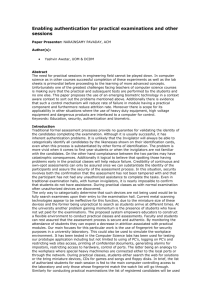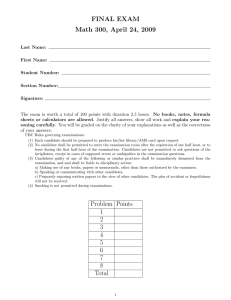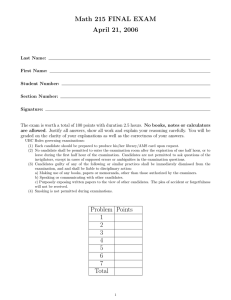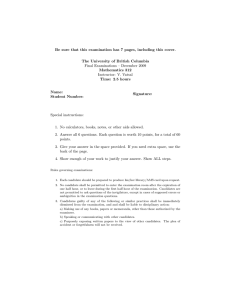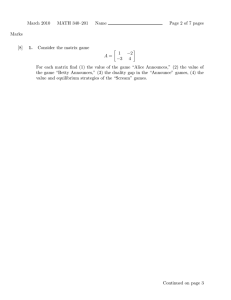UNIVERSITY OF WARWICK Instructions to Invigilators 2015/16
advertisement
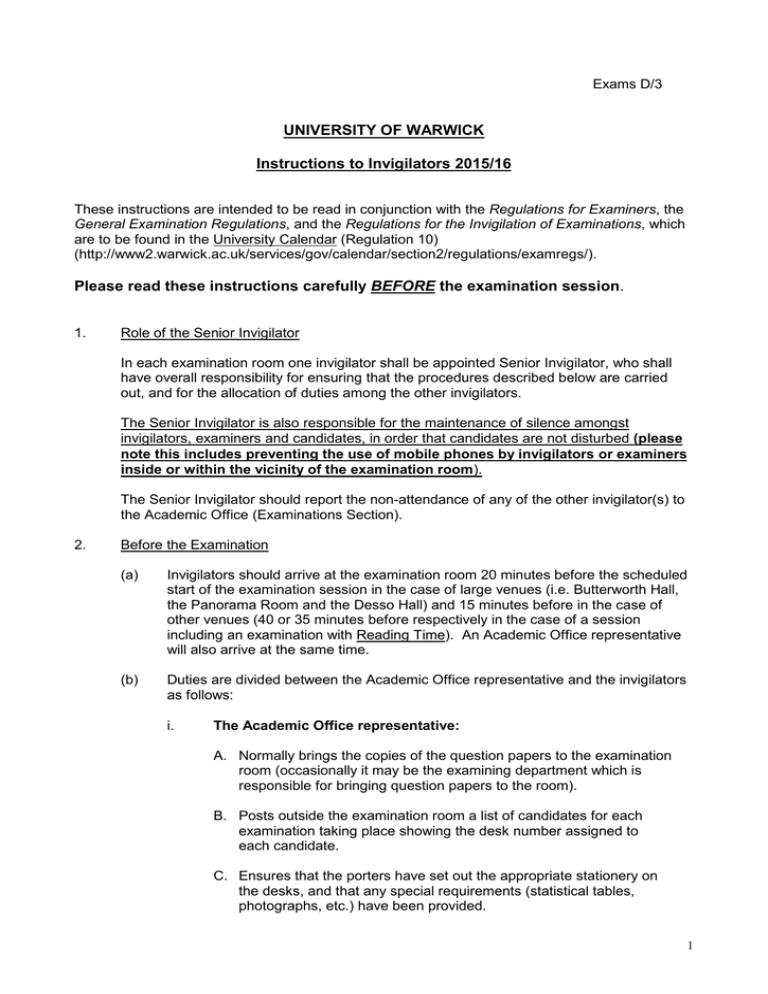
Exams D/3 UNIVERSITY OF WARWICK Instructions to Invigilators 2015/16 These instructions are intended to be read in conjunction with the Regulations for Examiners, the General Examination Regulations, and the Regulations for the Invigilation of Examinations, which are to be found in the University Calendar (Regulation 10) (http://www2.warwick.ac.uk/services/gov/calendar/section2/regulations/examregs/). Please read these instructions carefully BEFORE the examination session. 1. Role of the Senior Invigilator In each examination room one invigilator shall be appointed Senior Invigilator, who shall have overall responsibility for ensuring that the procedures described below are carried out, and for the allocation of duties among the other invigilators. The Senior Invigilator is also responsible for the maintenance of silence amongst invigilators, examiners and candidates, in order that candidates are not disturbed (please note this includes preventing the use of mobile phones by invigilators or examiners inside or within the vicinity of the examination room). The Senior Invigilator should report the non-attendance of any of the other invigilator(s) to the Academic Office (Examinations Section). 2. Before the Examination (a) Invigilators should arrive at the examination room 20 minutes before the scheduled start of the examination session in the case of large venues (i.e. Butterworth Hall, the Panorama Room and the Desso Hall) and 15 minutes before in the case of other venues (40 or 35 minutes before respectively in the case of a session including an examination with Reading Time). An Academic Office representative will also arrive at the same time. (b) Duties are divided between the Academic Office representative and the invigilators as follows: i. The Academic Office representative: A. Normally brings the copies of the question papers to the examination room (occasionally it may be the examining department which is responsible for bringing question papers to the room). B. Posts outside the examination room a list of candidates for each examination taking place showing the desk number assigned to each candidate. C. Ensures that the porters have set out the appropriate stationery on the desks, and that any special requirements (statistical tables, photographs, etc.) have been provided. 1 D. Ensures the Senior Invigilator is aware of different finishing times, different types of examination (Reading Time papers, Open Book papers, Seen papers), and of candidates listed who have special examination arrangements. ii. The invigilators: A. Under the direction of the Senior Invigilator, set out the correct question paper on each desk in accordance with the label on the examination packet (the label will state the precise seat numbers for that paper). Question papers should be set out face down. B. Obtain from the examiners (who should be present to check their papers) the telephone numbers at which they may be contacted in the event of a query arising during the examination, and ask the examiners to remain outside the examination room for the first ten minutes of the examination, in case any candidates have questions. The Senior Invigilator should also check with the examiners whether there are any corrections to the examination papers to be announced. If there are any corrections or special instructions, the Senior Invigilator must ensure that any candidate(s) sitting the examination in their department(s) or in the central special exam arrangement rooms LIB2 and H1.58 (Library and Humanities respectively) are informed (by telephoning both the relevant Departmental Secretary and the Academic Office (Examinations)). C. Admit the candidates to the examination room when (and only when) the Senior Invigilator is satisfied that the room is properly prepared. Candidates for papers with Reading Time shall be admitted so as to allow 15 minutes undisturbed Reading Time before the scheduled start of the main session, that is, 15 minutes before all other candidates are admitted to the examination room. BAGS AND MOBILE PHONES IN EXAMINATION ROOMS D. Check that candidates do not bring into the exam room any bags, books, papers, etc., except for those materials which they are expressly permitted to have with them (in the case of calculators and Open Book examinations, however, this shall be the responsibility of the examiner). Candidates have been reminded that Regulation 10.2 states they should not normally bring bags into exam rooms: a copy of the instructions to students in this regard is attached as Appendix 3 to these instructions and all invigilators are asked to acquaint themselves with these before the examination period begins (please note that this year there is some additional provision for storage of students’ possessions in the Students’ Union). Please use your discretion in this respect, however, where students may have a legitimate reason for bringing a bag with them (such as a special needs arrangement permitting them to bring something to cope with a disability (e.g. a back-rest or cushion etc), or as circumstances may dictate (e.g. in the interests of avoiding undue delay to the start of exam sessions). If you do permit any students to bring bags into the exam room, please make sure that they 2 do not leave them where they cause an obstruction to entering or exiting the room. Candidates are also forbidden by Senate regulation to bring mobile phones into examination rooms; following instances of disturbance caused by mobile phones in examination rooms, the Board of Undergraduate Studies, at its meeting on 5th June 2013, resolved that “the Senate regulation on mobile phones in examinations be enforced to the letter, that is, that candidates simply be not permitted to bring mobile phones into examination rooms (except as may on occasion possibly be approved under special examination arrangements for individual students)” . The instructions to students in this regard (from the University website) are set out in Appendix 3 to these instructions; if any student is observed bringing a phone into an exam room they should be told to take it away and leave it elsewhere before being admitted to the room. Possession of a mobile phone in an examination will be regarded as a breach of the University’s examination regulations. 3. Starting the Examination: Announcements When the candidates have been admitted and have taken their seats, the Senior Invigilator should make the following announcements, exactly as written below in bold: (a) Please read carefully the instructions printed on the back of the attendance slip. (Allow students a minute or so to digest these instructions, which therefore do NOT have to be read out. The instructions are as follows: (i) Please leave your University Card (or other photograph – bearing identification) on your desk during the examination: REMEMBER TO TAKE IT WITH YOU WHEN YOU LEAVE. (ii) You may not leave your examination within the first half hour, nor in the last quarter of an hour of the examination session. (iii) If you finish the examination early and wish to leave altogether, you must first take your script(s) to the Senior Invigilator and report that you are leaving. (iv) If you are sitting short examinations which finish mid-session you should remain seated in silence at your desk, holding your script(s) in the air, until you have handed it to an invigilator. You should then leave the examination room quickly and in silence. (v) When you finish you must wait until you have handed your script to an invigilator before leaving your desk. If you have used more than one answer book, you should fasten them together with the treasury tag provided. (vi) If you have a query or need the assistance of an invigilator in any way, please raise your hand. Do not leave your seat unless absolutely necessary. 3 (vii) Please check that you have the correct examination paper, and that your copy of it is complete. (viii) Please read the instructions at the head of your paper, and make sure you understand and follow them. (ix) If you need to do any rough work, use the back page(s) of your answer book(s) and either cross through the rough work or identify it clearly as such before handing in your script; you may not use paper of your own for rough work). (b) (Any amendments to question papers which have been notified by the examiners should now be read out. It is the responsibility of the Senior Invigilator to ensure that any amendments to question papers are relayed to any students sitting the examination in another room(s) – see 2. (b) ii. B above). (c) Please fill in your attendance slip. (d) You may start. Where students are admitted early for Reading Time, announce to them "you have 15 minutes reading time during which you may make notes on the question paper, but may not start to write your answers until ALL students are told to begin". The usual announcements (a) (c) and (d) above are then made at the conclusion of the Reading Time, and after any other candidates have entered the room and seated themselves. 4. Control of Attendance As indicated above, each candidate is assigned a numbered desk, and a list of candidates' names with their University card numbers and desk numbers will be displayed outside the examination room for candidates to locate their desk numbers. Since the University’s adoption of anonymised examinations, two conjoined copies of the candidate list (these being for annotation by the Senior Invigilator) are provided inside the examination room. If a candidate says s/he does not appear on the seating list, the Senior Invigilator should refer the matter to the Academic Office representative who will check and if the candidate is missing will make any necessary arrangements. Each desk will have on it an Examination Attendance Form, which will be filled in by the candidates at the start of the examination. These should be collected by the invigilators after half an hour, no candidate being permitted to leave in that time. The attendance forms should then be checked against the conjoined candidate list. The invigilators should note on both halves of the conjoined candidate list any students: (a) (b) (c) who are absent who arrive late (noting the time of arrival) who leave early (noting the time of leaving). One half of this list (the “anonymised” portion) is intended for the examiner, and the other (which includes student names) for retention as the Academic Office central record, and it is for this reason that the information should be recorded on both portions, which therefore should NOT therefore be separated until after the end of the examination session. 4 Candidates are required to bring their University cards to each of their examinations (or another photograph-bearing form of identification) and have this on their desks during the examination; invigilators are not expected to check every student’s card, but students are informed that they may be subject to checking, and invigilators should make a note on the candidate list of any student they find not in possession of a University card or other photobearing ID and about whose identity they may be suspicious. Variable-length Papers Many individual examinations have two or even three lengths, the duration for a particular student being dependent on the number of sections (s)he is taking or the amount of assessed work (s)he has submitted for the module the paper is examining. The length for each student (in the case of variable length examinations) or the sections each is taking (in the case of sectioned examinations) will be indicated on the candidate lists. Should a candidate claim the length or section(s) appearing for them on the list is incorrect, s/he should be permitted to take the length of paper/section(s) s/he claims is appropriate, any amendments to what is printed on the list being noted by the invigilators on both portions of the conjoined candidate list, so that examiners will be aware of them. 5. During the Examination (a) Leaving the Examination Room Students may not leave the examination room (except when they have finished their examination) unless accompanied by an invigilator. Students leaving the examination room finally before the end of their examination must take their script(s) to the Senior Invigilator who should note the time of their leaving on both portions of the conjoined candidate lists. (b) Students with Medical or Emotional Difficulties 1. If the medical condition appears life-threatening, an invigilator should call Security on extension 22222 or 024 76 522222 and request an ambulance. (This is standard University procedure and will ensure that the ambulance is escorted to the correct place on campus when it arrives.) It is assumed that the student will not be continuing with the examination. If the incident occurs in the Rootes Building, please also inform the Rootes Duty Manager on 07824540900. 2. If the medical condition appears serious call Security, who are the University’s trained first-aiders, on extension 22222 or 024 76 522222. If the student is not able to resume the exam, explain to the student that it is their responsibility to consult a medical professional as soon as possible and to ensure that evidence of medical circumstances is passed promptly to their personal tutor. 3. If the student is simply in some distress and medical attention as such is not considered necessary, the invigilator, if unable to deal with the situation him/herself, should contact Security on 22083 and ask them to contact the on-call Student Support Officer (or for Saturday exams, the on-call resident Duty Tutor). The invigilator should make it clear where the examination is taking place and provide a contact number where s/he can be contacted [see list of venue phone numbers in Appendix 1]. The on-call Student 5 Support Officer will then contact the invigilator to see what support is needed. In this case the student may be able to resume the examination. 4. (c) If a student has to leave an examination because of medical/emotional difficulties as under 2 above, the Senior Invigilator should give the student a copy of the form “Medical Certificate for Conditions Affecting Examinations”, copies of which will be available in each exam room. This form can be completed by the student’s GP/nurse, Director of Student Support (or their delegated staff member), or the University Senior Tutor for subsequent submission by the student to his/her department. Late Arrivals The General Examination Regulations state that normally no candidate may be admitted to the examination room after the first half hour. However, if candidates turn up after this and no other unaccompanied candidate on that examination has left the room between the end of the first half hour and their arrival, they may be admitted at the discretion of the Senior Invigilator, who should make a note of this action on both sections of the conjoined candidate list. Any candidate who is excluded because other students have already left the examination should be advised in his/her own interests to report to his/her department as soon as possible or to contact the Academic Office Student Enquiry desk in University House. N.B. there is no obligation to allow a late candidate additional time at the end of an examination to make up for that lost through late arrival. (d) Queries in the examination room Invigilators should take seriously all queries from candidates even though in some cases they may seem trifling. It is particularly important if a query is raised about the interpretation of an examination question or a rubric that the responsible examiner is contacted. It may seem appropriate to use "common sense" on such occasions, but this can lead to students being wrongly advised, and it is better to err on the side of caution. The Senior Invigilator should ensure that at all times at least one of the assistant invigilators is watching the room to spot students wishing to attract attention. In large rooms one or two of the invigilators should station themselves towards the back of the room. (e) Disturbances (including fire alarm) In the case of external disturbances from other students etc, the invigilators should inform the Academic Office (Examinations) so that appropriate action can be taken. If there is noise is from building works, please report this to the Security Gatehouse on x 22083 and they will immediately contact the contractors. Other queries relating to the bigger venues may be referred to the reception desk attendants (sports halls), the box office attendants (Arts Centre) and Rootes Building Duty Manager (07824540900) (for rooms in the Rootes Building) for assistance. On Saturdays advice/assistance may be sought if necessary from Security (x 22083). Any student causing a disturbance in the examination for whatever reason should be required to leave the examination room. A full report should be made to the Academic Registrar of any such occurrence. 6 In the case of fire or other alarm, all materials, coats, etc, must be left in the room, and candidates and invigilators should leave in accordance with the instructions of the staff responsible for the building in which the examination is taking place and/or the instructions posted in the building. Once an all- clear is received, candidates should (if it is practical) be allowed to resume the examination and additional time allowed to compensate for the stoppage. In such a case the Senior Invigilator should make a written report to the Academic Office (Examinations), so that the relevant academic departments may be informed of the occurrence. (f) Cheating Invigilators should check the aisles during the early part of the examination session to ensure that candidates have not brought in, either accidentally or deliberately, any prohibited items. Where invigilators suspect a candidate of cheating they should, after informing and consulting the other invigilators, warn the candidate that a full report will be made. The candidate should then be permitted to finish the paper. A full written report of the circumstances should then be made to the Academic Registrar immediately after the examination; in writing such reports invigilators should confine themselves to the facts and avoid writing anything which could be later interpreted as pre-judging the matter. The student should be informed that (s)he has the right to submit a written statement to the Investigating Committee that may be called to consider the case. Please also note information concerning students’ University cards under section 4 (Control of Attendance) above. (g) Calculators It is the responsibility of each academic department to control whether students are using permissible calculators, since the criteria may vary from examination to examination (see 2b.ii.D above). It is the students' responsibility to make sure their calculators are working and have fresh batteries. Students are not permitted to share calculators, nor to pass them between each other during an examination. Use of a non-permissible type of calculator or other electronic device will be regarded as cheating. (h) English Language Dictionaries Students whose first language is not English are permitted to use a bilingual dictionary during University examinations, except that bilingual dictionaries may not be used in certain examinations in which their use would negate the purposes of a particular examination (such prohibitions will be published to students in departments and outside exam rooms). A bilingual dictionary is defined as a single-volume, non-specialist, general-purpose bilingual translation dictionary covering English and the student's first language. Students are required to provide their own dictionaries and a student’s academic department is required to confirm a student is an appropriate user of a bilingual dictionary and to certify students’ dictionaries as suitable for examinations use prior to the examinations taking place (in a similar fashion to the licensing system in use for calculators). The student's name and University card number should be clearly indicated on the inside front cover of a dictionary, together with a departmental 7 stamp and authentication by the signature of the Departmental Chief Examinations Correspondent (or other nominated departmental authority). Departments should also make clear to the students that a dictionary may be checked by any member of staff before, during or after an examination. Invigilators are not expected to check all dictionaries routinely (but are of course free to check a student’s dictionary if they have reason to do so). (i) Smoking Smoking is not allowed in examinations. (j) Students’ Requests for Additional Answer Books Please use only 8-page answer books if students need additional copies – these will have covers in pale blue or pale grey. Please do not use the answer books with gold, pink or green covers as additional answer books. When issuing an additional answer book please make sure the student is issued with a treasury tag to attach the answer books together, and please make sure that all the answer books the candidate already has have been used. (k) Open Book Examinations and Seen Papers Open Book examination papers are printed on different coloured papers so that the invigilators can tell at a glance which students are permitted to bring books and materials into the examination room. Yellow paper denotes an examination where students may use any notes and texts except University of Warwick library books. Open Book examinations where the number and nature of the books is restricted and only particular texts are permissible are printed on blue paper (in this case the paper rubric will state which texts are permitted). The Seen element of an examination paper is printed on pink paper and circulated to the students a specified time before the examination. The students may not use this copy of the question paper in the examination itself (so any pink copies on students' desks should be removed). 6. Terminating the Examination It is the responsibility of the invigilators to make sure that each group of students leaves the examination room at the correct time. A brief announcement should be made 15 minutes before the end of the session as a whole to remind students that they are not allowed to leave during those fifteen minutes. At the end of the session students should be reminded to wait until they have handed their scripts to an invigilator before leaving their desks; do not permit students to leave the room before their scripts are collected. Please also remind students that all unused answer books and other University examination materials must be left on their desks (not on the floor) and must NOT be taken from the room. Where there is more than one finishing time in the session, an announcement should be made 15 minutes before each finishing time. A guide to timings is provided at the end of this document (Appendix 2). Please also ensure that if a group of students is leaving mid-session that 8 when you make the announcement that you remind them they must leave the room QUICKLY and IN SILENCE, since other candidates will still be working. 7. After the Examination At the end of the examination session, the Senior Invigilator should arrange for the scripts for each examination to be collected (instructing invigilators to ensure that candidates remain at their desks until their scripts have been collected). Where an examination script comprises answers in separate answer books, the invigilators should, if it is practical to do so, cross-check with the annotated candidates' lists that there are the correct number of books, joined together with a treasury tag. A final check of the room should be made in case any further completed answer books have been left on desks. Invigilators should check the number of scripts before allowing examiners to separate scripts consisting of more than one answer book (Senior Invigilators may care to identify clearly before the examination session finishes who among their colleagues will be their primary helper(s) for script checking). It is not the responsibility of invigilators to check that students have answered the correct sections, nor to divide examination scripts comprised of more than one answer book into the various sections. In the case of short examinations which end mid-session, scripts should be collected with due regard to minimising any disturbance to remaining candidates. When all scripts have been collected and counted, the total number for each examination should be entered on the examination room record sheet together with the number of absences from the room for that paper (if any). The responsibility for accounting for examination scripts is that of Senior Invigilators, who must therefore satisfy themselves that the numbers of scripts shown on the examination room record sheet tally with the numbers of candidates present in the room. Examiners are asked to collect their scripts directly from the examination room but not until all the examinations in that room have finished. Otherwise, the scripts will be returned to the Academic Office for delivery later to the examiner's department. In both cases it is the responsibility of the Senior Invigilator to ensure that the correct number of scripts is handed over, and in those cases where the examiner collects directly from the examination room, to see that the examiner signs the examination room record sheet as a receipt for the scripts. In the case of examination papers in separate sections where these have been answered in separate books, the answer books should be joined together by students with treasury tags, and counted as single scripts, and handed over as such to the examiner responsible. Examiners collecting scripts should also be given the anonymised portion of the annotated candidate list (marked “Examiner’s copy) for that examination, and any spare copies of the question paper. IMPORTANT No scripts should be handed over to examiners until the Senior Invigilator is satisfied that s/he has collected in the correct number of scripts for every examination in the room. It is also very much in the interest of the Senior 9 Invigilator to make clear to examiners that this will be the case. A group of insistent examiners rushing the checkers can make the task of clearing up after an examination session more difficult than it need be, and can lead to the making of unnecessary errors, and for this reason the University Examinations Committee ruled that examiners are required to remain outside the examination room at the end of the examination until permitted to enter by the Senior Invigilator. All attendance slips, any invigilators’ reports, the portion of the annotated candidate list bearing students’ names (marked “Academic Office copy”) and the examination room record sheet should be returned to the Academic Office representative, together with any uncollected scripts. 10 APPENDIX 1 Important Telephone Numbers 23633 Examinations Section of the Academic Office (all enquiries) 24888 Health Centre 22776 Porters 22083 University Security (main gate lodge) 22222 For an incident requiring the emergency services (e.g. ambulance) 07824540900 Rootes Building Duty Manager (for rooms in the Rootes Building, i.e. Panorama Room, Chancellors suite, Rootes Restaurant area). The nearest telephone for use by invigilators is at the Rootes entrance reception desk (ground floor), x 28081. There are telephones inside the Panorama Room (x 28949) and the Chancellors Suite (x 72508) mounted on the walls adjacent to the corridors, but these should not be used if candidates have started examinations and so may be disturbed. When calling 07824540900, dial 9 first if calling from an internal phone. 22265 Butterworth Hall (prompt corner) 74327 Room PS139 (Physics’ Research Secretary’s room), for examinations in room PS128 (main campus Science building (Physical Sciences), building 42 on the campus map (http://www2.warwick.ac.uk/about/visiting/maps/campusmap)). 26501 F107, F110, F111 Engineering (the telephone is on the wall just outside the Study Area room F106, which is directly opposite F107) 22861 Westwood Porter's Lodge 24734 Westwood Games Hall (reception desk) 23011 / 23039 Main campus Sports Hall (Desso Hall) (reception desk) 26895 (in front entrance foyer of Westwood Teaching Centre) for rooms in the Westwood Teaching Centre (building 73 on campus map http://www2.warwick.ac.uk/about/visiting/maps/campusmap/). First Aid Supplies For simple problems, i.e. headaches, minor cuts and bruises, etc., First Aid supplies can be obtained and local First Aiders contacted, as follows: Rooms in Rootes Building Rootes Building Duty Manager 07824540900 Arts Centre Box Office Westwood Games Hall Westwood Games Hall Reception Desk Main campus Sports Hall (Desso Hall) Front entrance reception desk F110, F107, F111 Engineering via School of Engineering reception (x 28193) 11 PS128 main campus Science building (Physical Sciences) Room P448a (x 22260) or P134 (x 50897) (Physics’ First Aid contacts) WT0.03 Westwood Teaching Centre See first aid contact details posted by phone in foyer. Nearest toilets Nearest refreshments Panorama Room / Chancellors Suite Between Panorama Room and Chancellors’ Suite Costa (ground floor) Rootes Restaurant area Outside the restaurant, opposite the Rootes bar. Costa (ground floor) Arts Centre Backstage or foyer Cafeteria Main Campus Sports Hall (Desso Hall) Additional “Dry Sports” Changing Rooms (follow signs) and front entrance foyer Front entrance foyer Westwood Games Hall In the changing rooms Drinks machine in foyer F107, 110, 111 Near the stairs Basement PS128 On landing before corridor leading to PS128 Science building concourse Westwood Teaching Centre Front entrance foyer area Front entrance foyer area 12 APPENDIX 2 UNIVERSITY OF WARWICK Guide for Senior Invigilators: Timings Morning Start Afternoon Lay out examination papers on desk Start Get examiners' names and phone numbers on exam room record sheet Get any corrections to papers *9.05 (for 9.10) Let in reading time candidates *1.35 (for 1.40) +*9.25 (for 9.30) Let in other candidates 9.30 Announcements, corrections, start 2.00 10.00 End of "no leaving" period 2.30 +*1.55 (for 2.00) Collect attendance slips 10.15 Warning for those leaving after 1 hour 2.45 10.30 End of 1 hour 3.00 10.45 Warning for those leaving after 11/2hours 3.15 11.00 End of 11/2hours 3.30 11.15 Warning for those leaving after 2 hours 3.45 11.30 End of 2 hours 4.00 12.15 Warning for end 4.45 12.30 End 5.00 End Collect all scripts: when all checked release to examiners. End Make sure examiners and invigilators sign the room record sheet. * Allow 1 minute for about 40 students to enter, + 2 minutes for announcements. 13 APPENDIX 3 Guidance published to students regarding bags and mobile phones etc in examinations: IMPORTANT NOTICE ABOUT EXAMINATIONS : PLEASE NOTE Bags and Mobile Phones in Examination Rooms Please remember that the University’s Regulation 10.2 states that: “Candidates are forbidden to take into an examination room any books, papers, calculators, or any information storage and retrieval device, or any case or bag …unless there is an express provision otherwise in the case of a particular paper”, nor may they take in "any devices which may emit noise or are likely to disturb other candidates". 1. BAGS Candidates therefore must not take any bags, cases, or backpacks etc into examination rooms. The only exceptions to this are: (a) small pencil cases may be used for pens, pencils and rulers etc; (b) if necessary plastic carrier bags may be used to carry permitted texts or other material into openbook examinations (unless you have been given special individual permission to have any other kind of bag with you in connection with an approved special examination arrangement). (**N.B. small personal items such as keys, wallets, purses etc that you would normally carry with you may be kept on the person e.g. in pockets or in permissible pencil cases as under (a) above**). *You are therefore strongly recommended not to bring bags with you to examinations*. If you do, you will not be permitted to bring them into the exam room (other than as noted above). Also you must not leave bags outside exam rooms (e.g. in corridors) where they may cause any kind of obstruction. BAG STORAGE DURING THE SUMMER TERM EXAMS - Weeks 4 to 9 (16 May - 23 June) (a) There is some limited and mostly unsecured space in the vicinity of some (not all) exam rooms where if you have to you may leave bags, AT YOUR OWN RISK, as noted below. **VERY IMPORTANT - PLEASE NOTE: if you leave anything in the unsecured places specified below this is AT YOUR OWN RISK and YOU SHOULD NOT LEAVE ANY VALUABLES. The University will not accept any responsibility for belongings left in the locations below**. Panorama Room, Rootes Restaurant Area, Chancellors Suite (Rootes Building): Further information will be posted on notices displayed in the Rootes Building about available space(s) in which bags may be left, prior to each relevant examination session. Butterworth Hall (Arts Centre): dock area behind the Butterworth Hall stage - please follow the notices that will be displayed. 14 Westwood Games Hall/Desso Hall (Sports Centre): items may be left in the lockers in the male and female changing rooms as appropriate (n.b. you will need a £1 coin (returnable) if you wish to secure a locker). Rooms F107, F110, F111 (Engineering) and rooms LIB2 (ground floor, Library) and H1.48 (Humanities): bags may be left in room H0.58 on the ground floor of the Humanities building on the other side of Library Road. However, please remember that the storage spaces noted above are limited in capacity and you are asked not to bring bags to examinations. (b) During the main exam period this year (weeks 4 -9 (16 May – 23 June), Summer Term) the University is trialling the provision of a controlled central storage facility, where students may leave their bags whilst taking exams. The facility will be staffed and located in the Student Union Building on main campus, in: Copper Rooms 2, Atrium entrance (upstairs in the SU Atrium) apart from on the 9th, 16th and 23rd of June when this facility will be located in: The IKEA Space (Downstairs in the SU Atrium, next to the pharmacy) The facility will operate between the hours of 7.30am and 6.30pm and is available for the use of all candidates taking examinations on campus. You should follow the local signage to drop off your bag, but remember to leave sufficient time in advance of your exam as the doors to the facility will shut promptly 30 minutes before examinations start, so please allow plenty of time prior to your exam if you wish to use this facility. Please also note that the facility will only accept bags and not individual items such as phones, etc. This facility will be free of charge. Whilst the University will supervise the facility and ensure it is attended during opening times, students are reminded that they individually responsible for insuring their personal belongings and the University cannot be held responsible for loss of, or damage to, any articles deposited in the facility. 2. MOBILE PHONES, SMART WATCHES AND SIMILAR DEVICES CAPABLE OF INFORMATION STORAGE AND RETRIEVAL Please note that the University Senate has also resolved that students shall not be permitted to take into examinations mobile phones and similar devices capable of information storage and retrieval, nor any devices capable of emitting noise likely to disturb other candidates. If you have such items with you, you should leave them in your bag and leave your bag in the attended deposit facility (see above) if you wish to keep them safe while your examination is in progress. Following disruptive incidents involving mobile phones in exam rooms, the University's Board of Undergraduate Studies resolved that the Senate regulation on mobile phones in exam rooms shall be enforced to the letter, that is, candidates shall not be permitted to bring mobile phones into exam rooms (except as may on occasion possibly be approved under special examination arrangements for individual students). Students should therefore note that the previous practice of some measure of tolerance, whereby mobile phones brought to exam sessions could be left at the front of the room with the invigilators, will no longer apply, and any candidate attempting to take a mobile 15 phone into an exam room will not be admitted to the examination with the phone. Therefore when you have an exam you should leave your phone at home, or with a friend, or in a location away from the exam room while you are sitting the examination (see further information on attended storage facility above). Please note that candidates who breach the University's examination regulations may render themselves liable for action under the University's disciplinary or cheating regulations. 16
